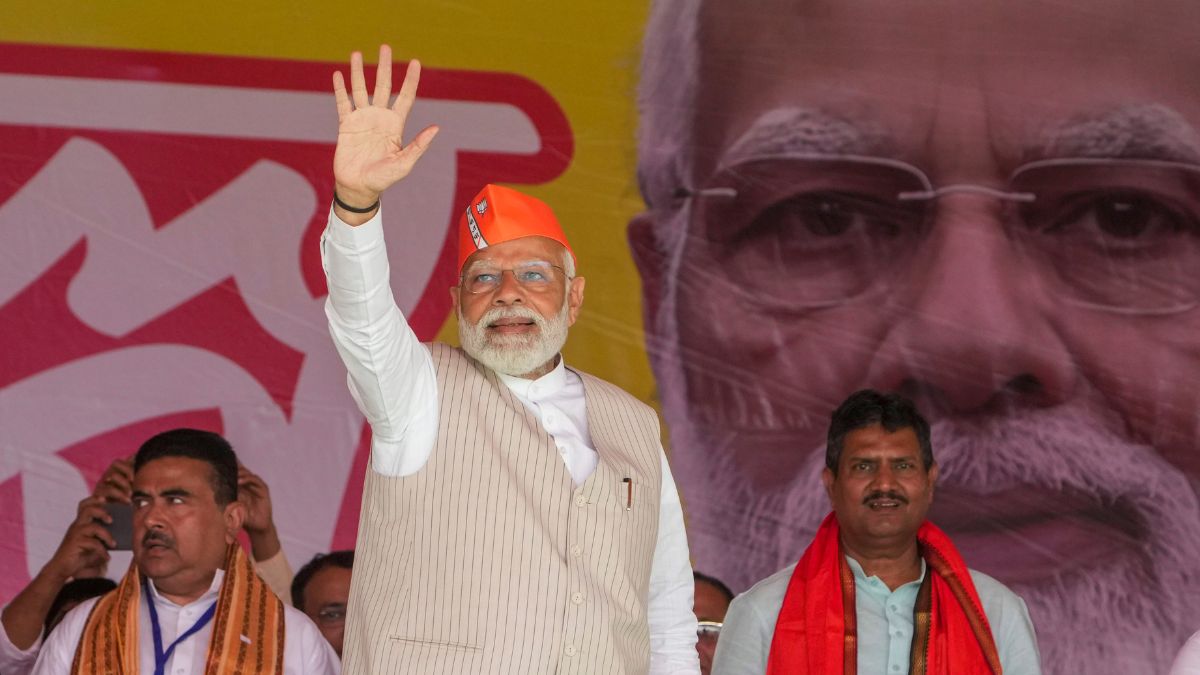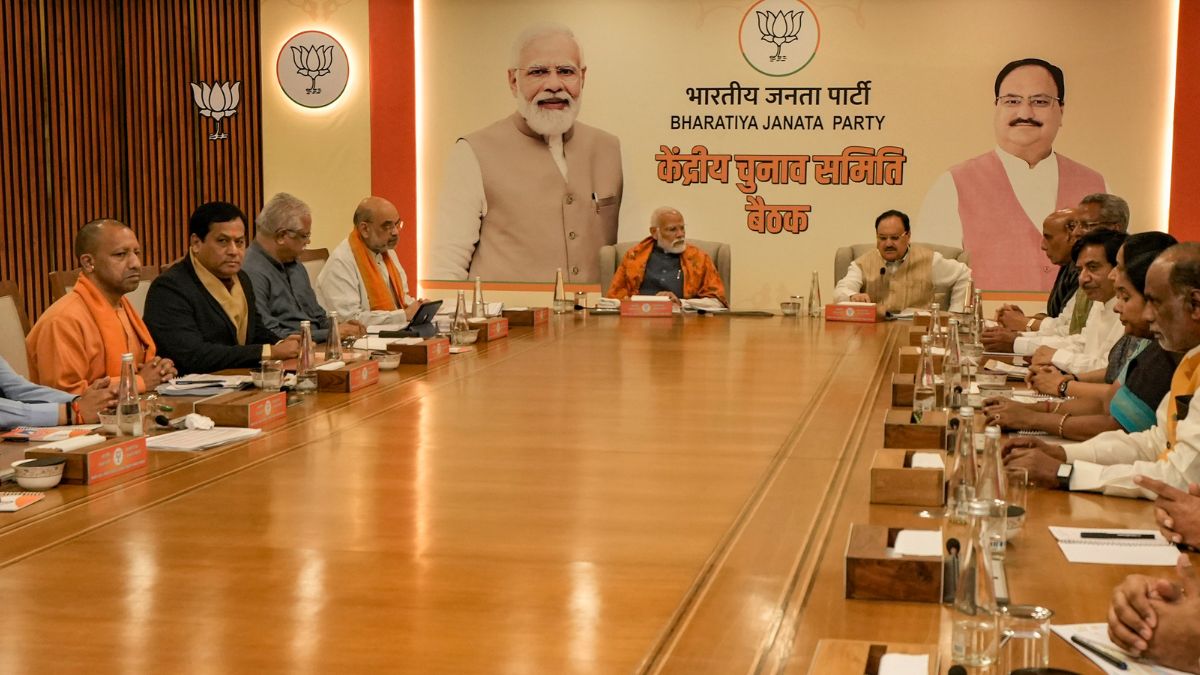A fresh wave of political bickering is likely to take over the political battlefield in Uttar Pradesh as third phase of polling came to an end, and extensive campaigning for the fourth phase reached its pinnacle.
While voter turnout remained relatively low with only around 62 percent voters turning up to polling booths, politicos upped the ante in the electioneering for the next phase. Fresh barbs were traded at election rallies for the fourth phase and all eyes remained fixed on the high-stake competition in Lucknow and the Yadav bastion of Mainpuri-Etawah belt. The entire Yadav clan was also under intense public scrutiny for any signs of distress within the family as they cast their vote. Stray incidents of violence — firing, preventing some from voting and stone pelting — were reported from some places though voting was by and large peaceful in most constituencies.
Here are the key highlights from the day:
Voter turnout
As many as 69 Assembly constituencies in the Yadav heartland, considered crucial for the ruling Samajwadi Party in the state, went to the polls in the third phase of the ongoing polls. Voter turnout, however, remained low at 61.16-percent. But it was slightly higher than the turnout observed in the 2012 Assembly (59.96 percent) and 2014 Lok Sabha polls (58.43 percent). The polling percentage was observed at 64.2 percent in the ongoing election, whereas in the second phase voter turnout was little over 65 percent.
UP Chief Electoral Officer T Venkatesh said that the exercise was held by and large peacefully in this phase, adding that tight security arrangements were put in place at all the 25,603 polling booths.
Polling in this phase began slowly but picked up pace, later. There were reports of minor skirmishes between the supporters of the candidates at some polling booths.
In the 2012 Assembly polls, the SP had won 55 of these 69 seats, while the BSP, BJP and Congress had secured only six, five and two seats respectively. One seat was won by an Independent candidate.
There were 826 candidates in the fray in the third phase whose fate will be decided by 2.41 crore voters, including 1.10 crore women and 1,026 people belonging to the “third gender” category.
Apart from SP strongholds — Kannauj, Mainpuri and Etawah — Lucknow (the Lok Sabha constituency of Rajnath Singh), Farrukhabad, Hardoi, Auraiya, Kanpur Dehat, Kanpur, Unnao, Barabanki and Sitapur were among the 12 districts where polling was held on Sunday.
Etawah is the native place of SP patriarch Mulayam Singh Yadav, while another key district is Mainpuri, which is represented in Parliament by SP’s Tej Pratap Yadav. Dimple Yadav, the wife of Akhilesh, is the MP from Kannauj.
In the third phase, the maximum of 4,98,573 voters exercised their franchise in the Sarojini Nagar seat in Lucknow, while the minimum of 2,72,294 voters were exercised in Sisamau. The highest number of 21 candidates were in Etawah and the minimum of three in Haidergarh (Barabanki). Lucknow West and Central had 17 candidates each.
Prominent among those, whose prestige is at stake, are Nitin Agarwal, son of SP leader Naresh Agarwal (from Hardoi), BSP turncoat Brijesh Pathak from Lucknow (Central) on a BJP ticket and Congress turncoat Rita Bahuguna Joshi (now in BJP), who is pitted against Mulayam’s daughter-in-law Aparna Yadav from Lucknow Cantt. SP leader Shivpal too is a key figure in this round. He is contesting from Jaswantnagar.
Congress leader PL Punia’s son Tanuj Punia is trying his luck from the Jaidpur seat in Barabanki. Interestingly, the much-vaunted ‘kaam bolta hai’ (work speaks) slogan of Akhilesh faced a litmus test in the battle of ballots in the state capital, the crucible of his dream projects.
Akhilesh has used the development card to the hilt during his campaign across the state, often highlighting his work in and around Lucknow, the city of Nawabs, doing away with the traditional SP politics that hinged on caste equations and dependence on the “M-Y” (Muslim-Yadav) factor.
Which way the youth vote will swing
Akhilesh remained a clear favourite among most of the youngsters Firstpost spoke to. Youngsters from across party lines said that the government’s scheme to distribute laptops and scholarships benefited them. Female students also lauded “Akhilesh bhaiya” for Kanya Vidya Dhan scheme. Predominantly, the mood was that at least the youth is ready to buy the development dream being sold by the Samajwadi Party.
Even a sizeable majority of BJP-leaning youngsters weren’t critical of Akhilesh but preferred Modi’s credibility over him.
In all this, Mayawati didn’t appear to hold much sway among the educated urban youth, who are unlikely to vote on caste or communal lines. She also seemed to be aware of it as she has gone out of the way to seek the support of Maulavis who, she thinks, have the ability to influence the Muslim vote share. But the youngsters do not take Maulavis seriously. Also, voting Mayawati in urban areas is perceived as helping BJP.
The impact of social media in urban areas is noticeable. The BJP-tilting youngsters often cite WhatsApp forwards when asked about demonetisation. The SP has also upped its game on social media with a full-fledged team operating from the Vikramaditya Marg. The lack of effective use of social media is another reason why Mayawati is struggling in urban areas and among the urban youth.
Conversely, another point of view was that because of social media, the electorate is getting increasingly cagey about expressing their views. A senior professor, speaking about the youth, said they are aware of how a single tweet about them can expose their inclinations. They are intimidated considering the vitriol on social media. “People haven’t been this reluctant to express their inclinations since emergency,” he says. Also, a reason why opinion polls are getting it wrong.
Heavyweights turn up to cast their vote
Chief Minister Akhilesh Yadav and the entire Yadav family, BSP supremo Mayawati and Home Minister Rajnath Singh exercised their votes in the third phase of UP elections and claimed that their parties will form the next government.
Mayawati, who cast her vote in the Mall Avenue area in Lucknow, told reporters that BSP would win over 300 of the 403 seats.
“Unlike the Congress and the BJP, I am not saying this without any basis. The way the people are attending my rallies, I can say that I am going to form the next government. The people of the state want change as they are fed up with the misrule and goonda raj of SP,” she said.
In a similar refrain, Singh, after casting his vote, claimed that the BJP would secure an absolute majority in Uttar Pradesh. BJP leader and Union Minister Sakshi Maharaj also cast his vote from Unnao where he again raked up the Ram temple issue and said that no one could stop BJP from building the Ram temple in Ayodhya.
At Saifai, Akhilesh said, “The voters have made up their minds in favour of the SP-Congress alliance,” adding that he voted not just for his party but for the “development and prosperity of Uttar Pradesh.” However, Akhilesh subtly, but decisively ducked any questions framed to seek a response on the family feud that eclipsed most part of the party’s campaign in the run up to the crucial polls.
Who said what in the Yadav clan
Flanked by his by cousin and Budayun MP Dharmendra Yadav and sporting the red-colour party cap, Akhilesh looked a little shaky and snapped back at certain journalists who asked some uncomfortable questions. He also got angry when the media persons asked about his father Mulayam Singh Yadav not accompanying him for vote like he always does.
Replying to a question whether he would like to wish his estranged uncle Shivpal Singh Yadav, who is contesting from Jaswantnagar, the Chief Minister wished that all SP candidates won the polls.
On the question why Mulayam Singh, whom he ousted as the National President of the party in January, did not turn up for joint rallies with him, Akhilesh Yadav said he probably wanted to cover other areas.
Amid reports of a not good performance in the erstwhile strongholds, the chief minister also ruled out “bheetarghat (internal sabotage)” against the ruling party candidates.
However, his uncle Shivpal was a little more forthcoming on the question of sabotage, amid reports of poll-related violence coming from his assembly.
Shivpal, who had a near escape as his motorcade was stone pelted, and later police lathi charged his supporters at a poll booth, complained that his supporters were attacked by the “political opponents” in his Jaswantnagar constituency. Without taking any names, Shivpal also expressed fear of attempts to sabotage the polls.
Meanwhile, Mulayam put up a composed front and refrained from sounding condescending towards anybody in particular. The SP patriarch, who came to cast his vote with his younger daughter-in-law Aparna Yadav, expressed hope that the Samajwadi Party will win under Akhilesh, adding that his son has delivered on the ground and people will vote for him.
Mulayam’s wife Sadhana Gupta tried to quell speculations about a possible rift between her and Akhilesh. “_Akhilesh aur Prateek meri do aakho ke samaan hai… koi sautelapan nahi hai, koi ladai nahi hai (_Both Akhilesh and Prateek are like my two eyes, there is no step-motherly treatment towards any of them from my side),” she said.
The next four phases of polling will be held on 23 and 27 February and on 4 and 8 March. Counting of votes will be taken up on 11 March.
With inputs from agencies


)




)
)
)
)
)
)
)
)